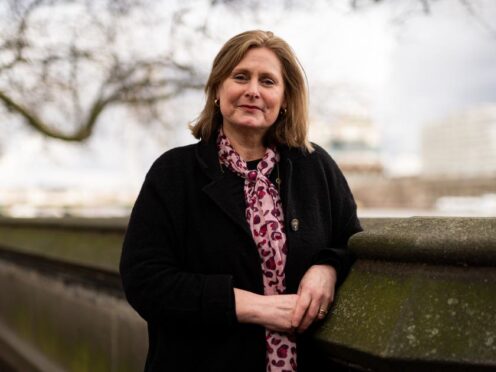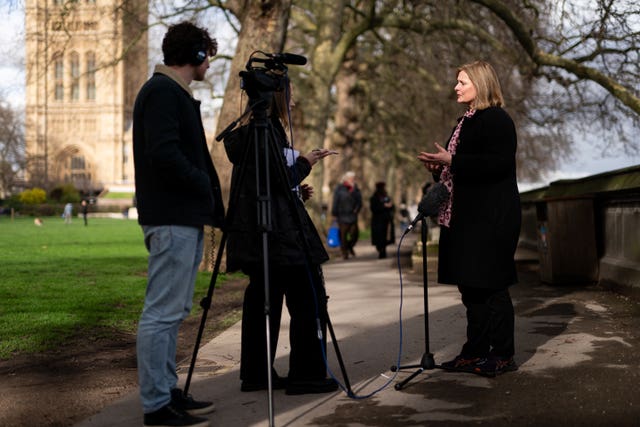
Education investment for children in conflict zones must increase, Sarah Brown has said, as her charity launches a new development project for young people in Ukraine.
The wife of former prime minister Gordon Brown is chairwoman of Theirworld, which announced the programme on Friday, the eve of the two-year anniversary of Russia’s invasion.
The project includes a Museum of Mathematics and an early years development programme, after the Ukrainian government said that education must be “the cornerstone of the country’s reconstruction”.
Mrs Brown told the PA news agency: “I would argue that we need to be doing more for humanitarian support across the board and that the education piece is absolutely critical.
“So we’re always driving at Theirworld to ask people to step up with that assistance for education. It doesn’t mean you’re not spending on other humanitarian assistance programmes, but we have to consider education.
“Children are the greatest casualties of war – we don’t do enough in any war ever to think about their safety, but also their prospects and what happens to them longer term. So education is the way we can do that, and we need to be creative about ways to deliver it to children in the direst of circumstances,” Mrs Brown said.
The £5 million Museum of Mathematics will open in Kyiv later this year, and will house more than 120 exhibits as well as an “innovation lab” to enhance the skills of mathematics teachers across the country. The museum will also embark on a nationwide tour to ensure children in remote areas benefit from the investment.
“The key thing in conflict is to be able to be flexible. You’ve got to look at where children are, and sometimes they might be somewhere but where they are isn’t stable, they’ll be moving again, so everything has to be very fluid,” Mrs Brown said.
“You always need the ability to be able to move and do what’s needed. So where there are children, we will find a way to reach them.
“I mean, there are children in underground schools, they’ve got pop-up schools, they’re using temporary buildings, and a lot of children aren’t even in Ukraine at all. So we’re going to make sure we reach them too.”

The early years development programme, a collaboration with the Ministry of Education and Science of Ukraine, will focus on supporting children in the first eight years of their life.
Mrs Brown said early years investment was a priority for the Ukrainian government, and formed an integral part of Theirworld’s strategy: “We’ve always thought that investment in that nought to five years is so crucial – 90% of a baby’s brain develops in those first few years. You can’t waste those precious years.”
Since the Russian invasion began almost two years ago, more than 100 early childhood schools have been destroyed and more than 1,000 damaged, and an estimated five million Ukrainian children have had their education disrupted.
Mrs Brown said Ukrainian President Volodymyr Zelensky offered his personal support to Theirworld’s early years project because he knew children had fallen behind in maths and science.
Students have suffered more than four years of disrupted education, first due to the Covid-19 pandemic, and then during the war.
“They all share a dream, the Ukrainian people, to go back and rebuild the country when there’s peace, and maths and science is going to be needed to do that,” Mrs Brown said.
The new project builds on the charity’s work to ensure pupils and teachers displaced by the war have access to digital devices to help them learn and teach remotely.
Since the start of the conflict, the organisation has helped to distribute more than 70,000 laptops to students and teachers in Ukraine and neighbouring host countries.
“Where children can’t be in a classroom or can’t be in their normal environment for school, then you’ve got to look at saying ‘right, let’s make sure we take the education to them’,” Mrs Brown said.
“It can be interactive, where we can offer tutoring, where you can offer engagement – this fantastic ‘Stay With Ukraine’ project that we’ve supported that allowed Ukrainian children to meet with each other, meet the teachers, keep using their language that even if they’re in other parts of the world, in those countries, they’re able to keep up and keep connected with Ukraine.”

Enjoy the convenience of having The Sunday Post delivered as a digital ePaper straight to your smartphone, tablet or computer.
Subscribe for only £5.49 a month and enjoy all the benefits of the printed paper as a digital replica.
Subscribe